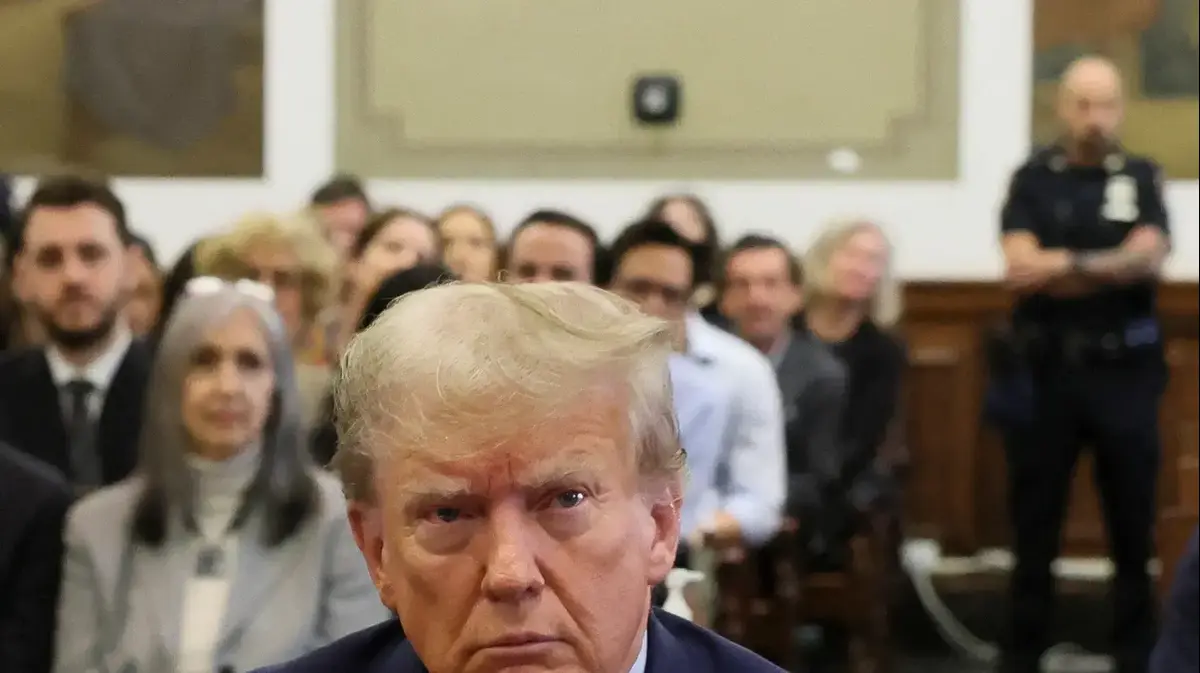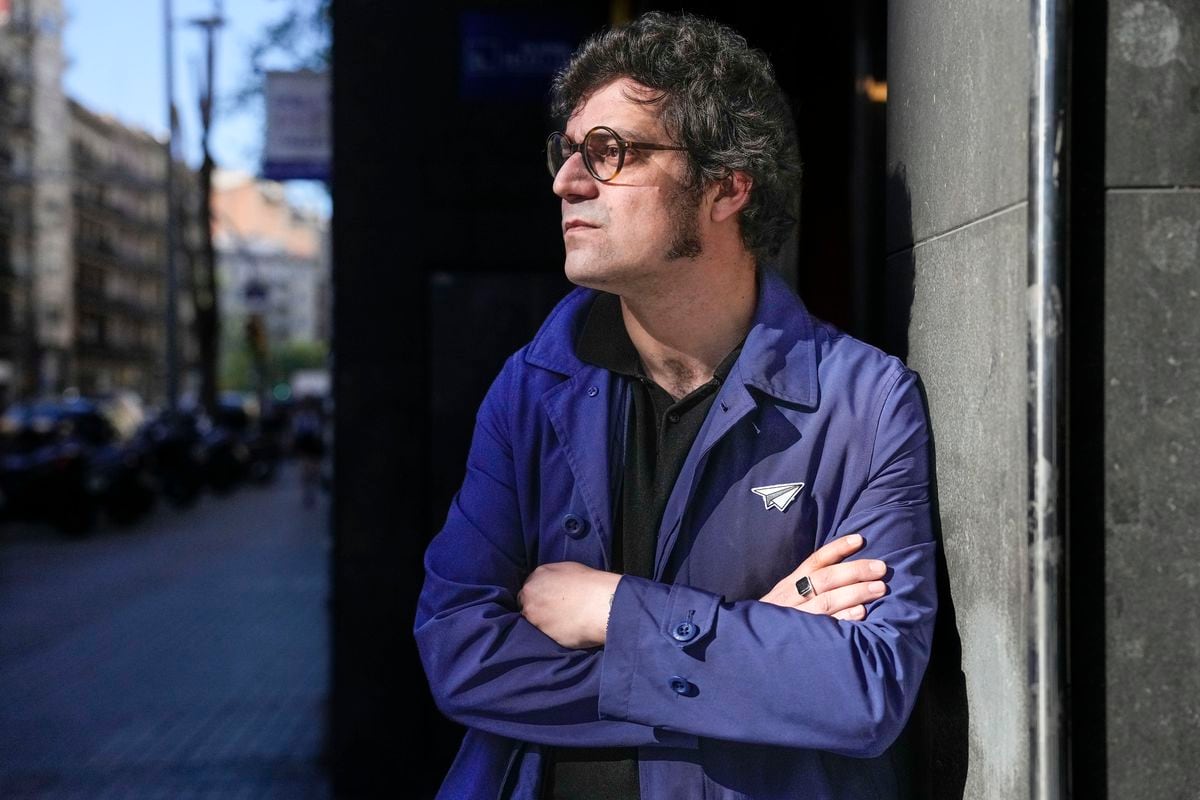The former president of China Jiang Zemin has died this Wednesday at the age of 96, as reported by the official Chinese agency Xinhua.
Jiang died in Shanghai at 12:13 p.m. (local time, seven hours less in mainland Spain) due to leukemia and multiple organ failure.
The president, who could no longer be seen at the last Communist Party Congress, held in October, served as the party's general secretary between 1989 and 2002 and as head of state between 1993 and 2003, giving continuity to the reform policies and opening started by Deng Xiaoping.
Jiang came to power as a factional compromise after the Tiananmen student protests of 1989, which ended in a harsh crackdown that killed hundreds if not thousands of protesters.
He was considered the person capable of balancing Deng's opening turn with the stability and control of the party at the head of the state.
Jiang Zemin greets Vladimir Putin in Beijing in 2000. Liu Jianguo (AP)
That year he was also appointed chairman of the Central Military Commission.
And he would later be elected the country's president in 1993, but it was not until the 1997 death of Deng, whose figure still cast a long shadow, that he effectively cemented his position at the apex of China's massive pyramid of power.
Jiang left power having laid the groundwork for China's rise to superpower status, with the growth engine running at full throttle, and having forged the image of a business-friendly and accessible global giant.
Under his mandate, the British return of Hong Kong to China was completed in 1997, a symbol that put an end to what many in the country know as the century of humiliation.
And this upward trajectory was crowned in 2001, also under his leadership, with China's accession to the World Trade Organization, and with the choice of Beijing to host the 2008 Olympic Games.
The leader left his position at the head of the party in 2002 and left the country's presidency in 2003, complying with the principles (written and unwritten) that governed the renewal of the leadership until recently after two terms of five years.
The current president, Xi Jinping, has turned these norms upside down with a constitutional change that would eventually allow him to be re-elected head of state for a third term;
He has recently been re-elected Secretary General for a third five-year term.
Jiang was succeeded as the Chinese leadership by former President Hu Jintao, 79, also open-minded and the protagonist of an unusual episode at the recent 20th Congress of the Communist Party, when he was forced to leave his seat in the Great Hall of the People before the impassive gaze of President Xi and the cameras of the international press.
The highest party bodies have been in charge of announcing Jiang's death through a letter addressed to all members of an organization that has more than 97 million people in its ranks.
The letter expresses "deep sorrow" for her death.
"Comrade Jiang Zemin was an outstanding leader who enjoyed high prestige recognized by the entire Party, the entire army, and all ethnic groups of the Chinese people."
He also credits him as "a great Marxist, a great proletarian revolutionary, statesman, military strategist and diplomat," as well as an outstanding leader of "the great cause of socialism with Chinese characteristics."
One of his great contributions was the so-called ―in the convoluted language of the party― “theory of the three representations”, which allowed businessmen to become part of the party.
This conceptual change made a key contribution to the economic takeoff of a country firmly governed by a single party, by opening a path that connected the vessels between communism and the incipient technological hypercapitalism of the 21st century.
Xi released
Jiang's theory is inscribed in the Party's Constitution, but without making reference to its author, contrary to what happens with the trinity that today configures the Olympus of Chinese power: Mao Zedong, Xi Jinping and Deng Xiaoping, whose theoretical contributions they do appear next to their names.
With his departure, together with the controversial episode of Hu's empty chair at the last Congress, the current leader, Xi Jinping, is free of all influence from his predecessors, who have traditionally exerted a counterweight in the decisions of the highest bodies.
The last congress, in which President Xi has been elevated to an unprecedented third term, has in some way marked the death certificate of the political legacy of Deng, Jiang and Hu.
Jiang was an electrical engineer by training, as well as a fan of classical music, an amateur pianist and a reader of poetry.
He starred in charismatic moments, unthinkable today in the country's leadership, such as dancing with the wife of the then French president, Jacques Chirac, or appearing as a guest on the mythical American talk show
60 minutes.
To this was added a certain fondness for singing.
In 2001, he sang the
O sole mio
impromptu at lunch with Luciano Pavarotti during the Three Tenors' visit to the country for a performance in Beijing.
That same year he ended a tour of Latin America singing with Julio Iglesias in the presence of Hugo Chávez, then president of Venezuela.
The deceased leader was also the protagonist of a complex diplomatic scuffle with Spain on account of the principle of universal justice.
In 2013, the National Court put the then ex-president in search and capture for the genocide in Tibet, one of the great anathemas for Beijing, and one of the dark spots in Jiang's file, along with the decision to ban in 1999 to the religious organization Falun Gong.
The Chinese persecution of its members was also investigated by the National Court.
The Spanish case on Tibet strained the ties between Madrid and the Chinese government to unsuspected limits, but ended up showing the power of what was already the second largest power on the planet: it forced a legislative change in Spain, promoted by the Popular Party, to reform the law of universal justice.
And, finally, the plenary session of the Criminal Chamber of the National Court, chaired by the current Minister of the Interior, Fernando Grande-Marlaska, decided to close the case, just as it happened with the cause of Falun Gong.
Jiang's death comes at a critical time in China, after citizens have taken to the streets in recent days to protest the country's tough anti-pandemic policy, in the biggest show of defiance to power in Xi's decade. .
The wave of discontent coincides with the slowdown of the great economic locomotive, which has lost steam at an unknown rate in the last three decades, due to the disruptions of the so-called zero covid strategy and the depletion of the growth model.
During Jiang's years in power, the foundations of what many analysts consider to be an unwritten social contract between the Communist Party and the citizenry were developed, whereby some give up a large part of their freedoms and entrust command to the single party in exchange. to benefit from the meteoric development of the country.
The takeoff of the 1990s and the first two thousand (a time that some nostalgic call the "golden years") has, however, slowed down in the last decade, which coincides with the rise of Xi as absolute leader.
With growth expected by many analysts to be below 4% this 2022, the economy affected by the continuous closures and disruptions, the slowdown in the real estate sector, the country practically sealed abroad for almost three years and the rates of infection by coronavirus breaking records, one of Xi's great challenges will be precisely that of trying to resolve the dark clouds of possible discontent that could end up blowing up the social contract promoted in the Jiang years.
Follow all the international information on
and
, or in
our weekly newsletter
.

/cloudfront-eu-central-1.images.arcpublishing.com/prisa/3OXQ6EZJVPJZYGJA2MRFN4R5GE.jpg)






